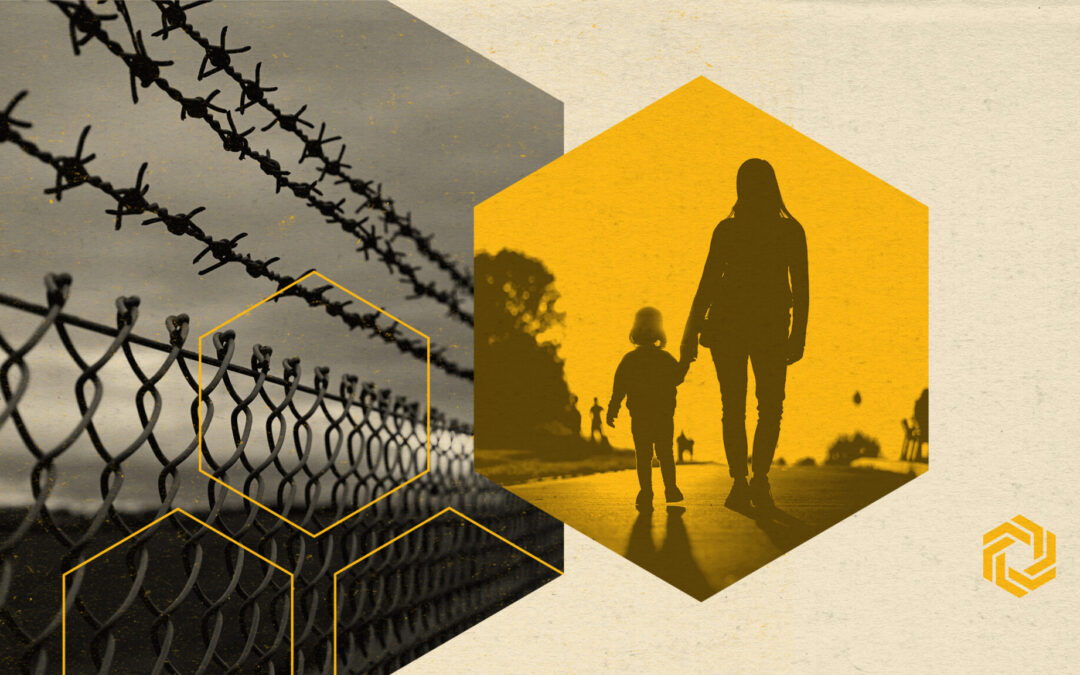This Mother’s Day, we ask you to join the Crossroads staff, mentors, volunteers, and supporters in prayer for the mothers of incarcerated men and women, along with prayer for mothers who are currently incarcerated. Incarceration doesn’t just impact individuals; it deeply affects families, especially mothers. Whether they are serving time themselves or grieving a child in prison, the emotional, financial, and psychological toll can be overwhelming. The effects of incarceration create cycles of trauma, financial hardship, and lasting emotional wounds.
The Reality of Being an Incarcerated Mother
Incarcerated mothers face unique challenges. More than half of women in prison, 58 percent, are mothers, and most were their children’s primary or sole caregivers before incarceration. Their sudden separation from their children is traumatic, leading to emotional distress and developmental challenges for those left behind. [1]
Mothers in prison often struggle with guilt and despair. “Crushed is the first word that came to mind,” one mother shared, recalling the moment she realized she would be incarcerated. [2] They miss birthdays, graduations, and even their child’s first steps, moments they can never get back. Limited visitation opportunities make it difficult to maintain a strong bond, which can complicate reintegration after release.
Faith can be a powerful source of strength and redemption. Many prisons offer faith-based programs that provide spiritual guidance, counseling, and personal growth opportunities. Engaging in prayer, Scripture study, and religious services helps many mothers find hope, self-worth, and a renewed commitment to change. Faith also builds resilience, helping them navigate the hardships of prison life while holding onto the hope of rebuilding their lives and reconnecting with their children.
The Struggles of a Mother with an Incarcerated Child
It is often said that when a child goes to prison, the entire family serves the sentence emotionally. Mothers of incarcerated children experience deep grief, guilt, and helplessness. Many also face social stigma, feeling judged or abandoned by friends, co-workers, and even family. One mother shared, “You kind of lose about 50 percent of them right off the bat. . . I lost my co-worker, I lost my best friend.” [3]
The pain of separation is immense. Mothers often blame themselves, wondering what they could have done differently. With limited communication and physical contact, every visit, phone call, or letter becomes a lifeline.
The financial burden can also be overwhelming. Many mothers take on legal fees, commissary costs, and travel expenses for prison visits, all while struggling to maintain financial stability.
For many, faith becomes an anchor in these difficult times. Turning to prayer, spiritual communities, and the belief in God’s power of redemption offers comfort and hope amid the turmoil.
Breaking the Cycle
The impact of incarceration on mothers and their children highlights the urgent need for reform. Policies that promote alternatives to incarceration for non-violent offenses, expand visitation rights, and focus on rehabilitation can help mitigate harm to families. Support systems, including counseling and reentry programs, are essential for helping incarcerated mothers rebuild their lives and reconnect with their children.
For mothers with incarcerated children, community support, financial assistance, and mental health resources can make a significant difference. Faith-based initiatives that provide mentorship, spiritual counseling, and practical help can be invaluable in the healing process.
Ultimately, addressing the impact of incarceration on mothers requires a compassionate approach, one that acknowledges the ripple effect of imprisonment and seeks to preserve the fundamental bonds of family.
This Mother’s Day, let’s remember the mothers affected by incarceration and lift them up in prayer. Ask God to bring them strength, healing, and hope as they navigate the challenges they face.
Thousands of mothers will spend this Mother’s Day apart from their children because of incarceration. Angelika P., a Crossroads student in Texas, shared how Crossroads has been a source of hope during this season of separation from her children. She said, “I learned that I’m not my past mistakes. And God can still use me in mighty ways. . . . Studying the Word is important to me. It helps me in my times of trials and tribulations. It is what is helping me through this time away from my kids. I couldn’t make it through this without God and the Word. I can’t wait to get my mentor’s feedback.”
Dina, a mother of a Crossroads student, also shared her appreciation for the support her son receives:
“I just want to thank you for your ministry and let you know I am praying for you. My son is incarcerated in Texas. From the beginning he has done your Bible studies and he sends me all of his certificates to keep in a file for him. The encouragement and comments of your mentors is so very meaningful to him, and to me. My son is a strong Christian, for which I am very, very thankful. Thank you and God bless all of you!”
You can bring hope to mothers behind bars and to the mothers of those who are incarcerated. Together, let’s remind these mothers they are not forgotten. They are seen, loved, and covered in prayer—and with your help, they will continue to experience God’s grace, even in the darkest places. Give today to support Crossroads as they equip mentors to walk alongside incarcerated people and their families with the love of Christ.
—
[1] Smyth, Julie. 2019. “Dual Punishment: Incarcerated Mothers and Their Children.” Columbia Social Work Review 10 (1):33-45. https://doi.org/10.7916/cswr.v10i1.1951.
[2] Miller Anderson, Kristi. “Moms in Prison: A Personal Story.” Corrections Today no. January/February 2020, January 2020.
[3] Allen, Melissa. “Mothers’ Lived Experiences with an Incarcerated Son: A Research Brief – Family Therapy Magazine.” Family Therapy Magazine – American Association for Marriage and Family Therapy, August 18, 2024. https://ftm.aamft.org/mothers-lived-experiences-with-an-incarcerated-son-a-research-brief/.


